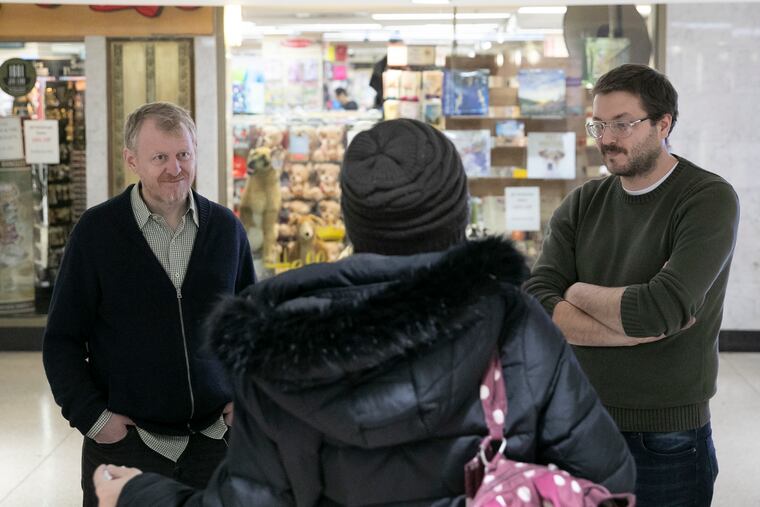You can ask philosophers anything at a Philly pop-up booth — at Suburban Station
Got a question? Get it answered by a philosopher at Suburban Station until Saturday.

“Anything on your mind?”
For Brandon Burwell, who was standing in front of the Ask a Philosopher booth in Suburban Station on Wednesday afternoon, there was.
“A lot of different things,” Burwell, 30, replied, as if he was thinking out loud. “Supposedly, time travel is possible.”
Posing the question was Ian Olasov, an adjunct philosophy professor at Brooklyn College, who created the Ask a Philosopher booth in New York in 2016 to bring philosophy to the public. Other philosophers have set them up elsewhere: beachside in Santa Cruz and on campus at Seton Hall University. This is the first time that the free booth has come to Philly, with a table in Suburban Station’s concourse until Saturday, thanks to the Eastern Division of the American Philosophical Association meeting.
Olasov dug into the topic. Burwell, of Nicetown, who works in the city’s human resources department and was on his lunch break, started to talk through theoretically how that would work: Time could pass by for different people at different rates, Burwell posed. For some people, that means time could move at a slower pace.
Meanwhile, on the other side of the booth, another passerby was tossing a question into air:
“What’s with the president and Iran?”
Bryan Sacks, a Drexel philosophy professor had a quick answer: “Ask a psychiatrist.”
During Wednesday’s four-hour session, many rushed by to their trains. Others dropped in for free sweets in a candy bowl but didn’t linger to pose a question. Others came with their thinking caps on.
Burwell and Olasov kept chatting. The philosopher, in turn, raised the Grandfather Paradox, or the notion that traveling to the past opens the possibility of reshaping the future, like if someone were to kill their ancestor and zap their own existence. There are physicists who point to that paradox to challenge the logic of being able to go backward in time. But what Burwell was talking about, Olasov assessed, was different and didn’t have the same logical roadblocks.
“If it’s logically possible, nine times out of 10 it’s physically possible,” Burwell said. He mused on the possibility of harnessing the perspectives of people who’d seen more years, who could speak to more history. “We’re taking about trying to build up a better future.”
“That’s interesting. I’ve never thought about it like that,” Olasov responded, nodding. “The same way that it would be useful to have a baby Yoda.”
The American Philosophical Association (APA) and the Public Philosophy Network are sponsoring this event. Professors and students attending the conference are dropping in to field questions. At the table, the curious can either ask their own questions, pick others to ponder or select “thought experiments” printed on strips of paper. Here are some examples:—
“If you could live forever, would you?”
“What was the last major moral dilemma you personally experienced?”
“Suppose that one day we learn to create extremely detailed computer simulations of entire universes. Once we create one, we can create as many as we like. There would be many simulated worlds, but only one non-simulated world. Would that mean that we probably live in a computer simulation?”
Often, Olasov said, visitors wind up speaking about “the concerns, problems and puzzles that [they] are walking around with, that preoccupy them.”
Richard Riley Jr., a law student who works for the city, walked up to the booth with this: “What do you think is the difference maker between those who are poor and those who are wealthy and those who remain poor and those who remain wealthy?”
Stephen Miller, who teaches philosophy at Oakwood Friends School and Marist College, answered with another question.
“Is it a good thing to have people who are poor?” Miller asked. “Most philosophers would say no.”
Through that lens, Miller explained, there’s then a societal problem and a question of how to fix it. Miller later mentioned the Easterlin Paradox, a theory that holds that people with higher-than-average incomes are often happier.
Riley so enjoyed the conversation, he told them he’d be back.
Before the 2016 booth concept, Olasov curated a series of talks at the central branch of the Brooklyn Public Library, hoping to bring philosophy to a wider audience. He saw that people were coming to hear what sparked the interest of philosophy professors.
“When people come to the Ask a Philosopher booth, it’s them driving the conversation,” he said, explaining the contrast. “It’s kind of nice to meet people where they are.”